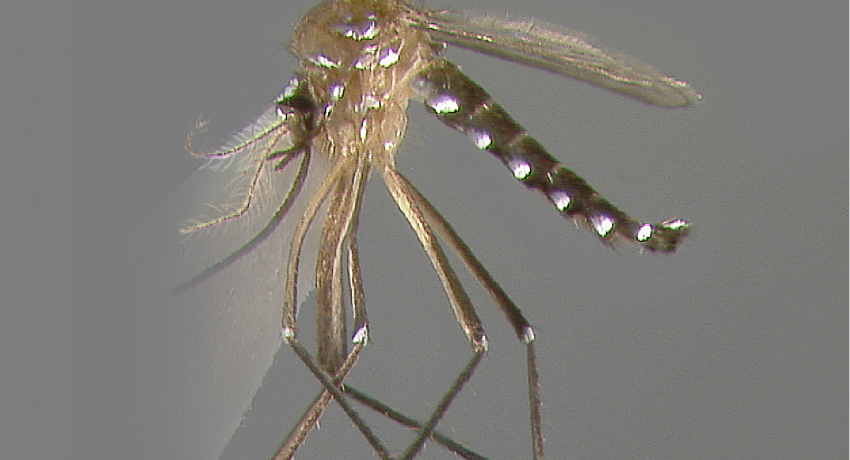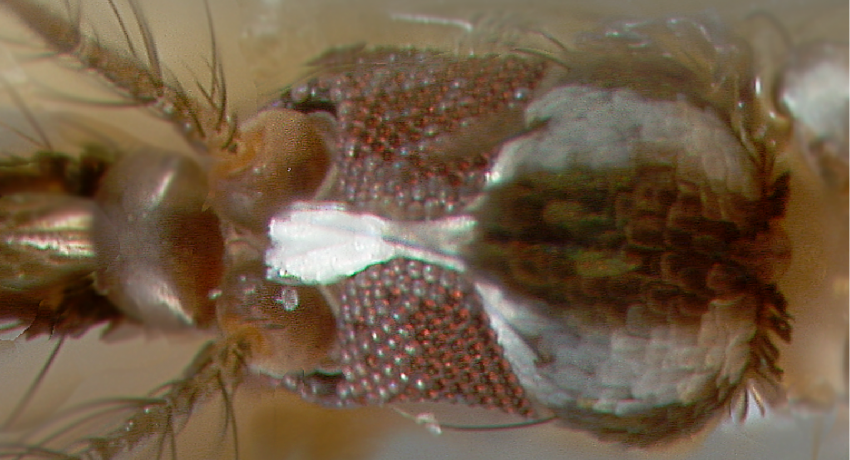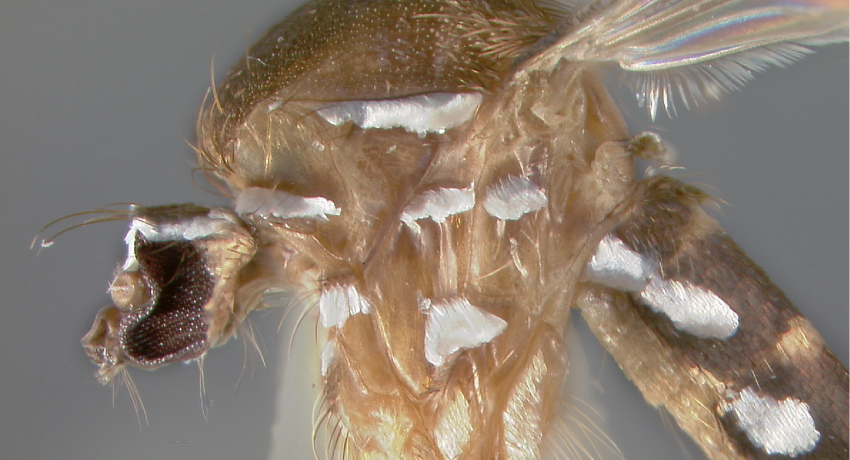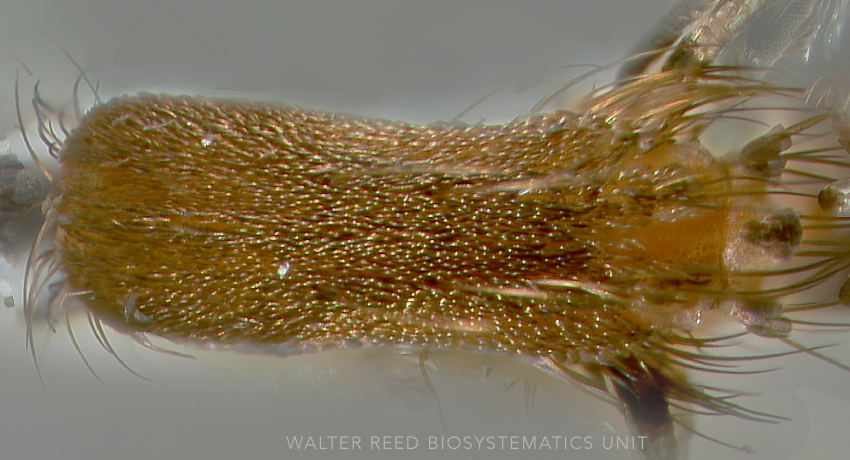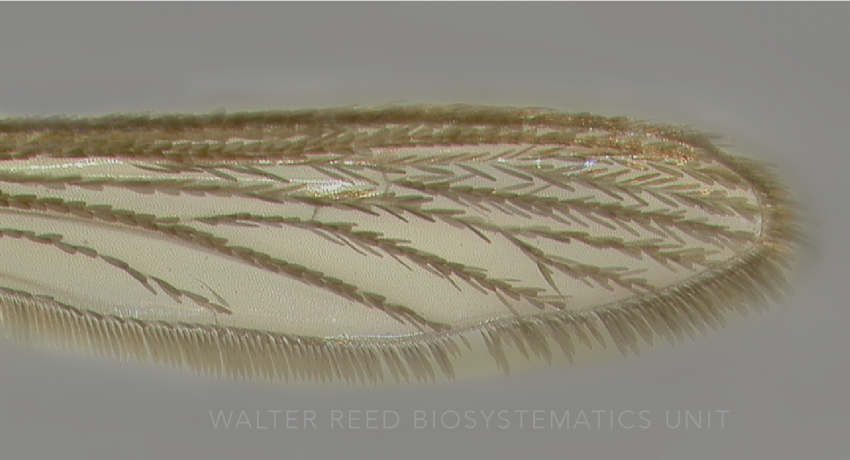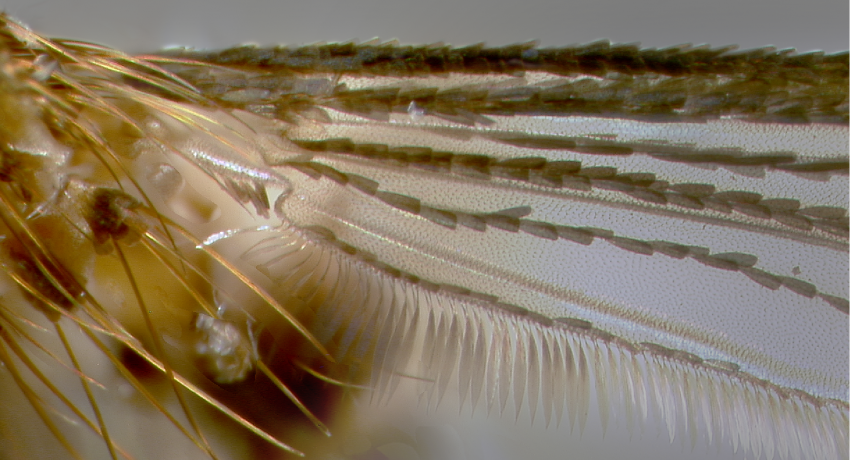ORIENTAL REGION
Generic abbreviation: Ud.
Type species: Paraedes argyrurus Edwards
Etymology: Udaya Sandhinand
Mosquitoes of the Aedine genus Udaya are small, highly ornate species, decorated with distinctive dense patches of silvery scales. In both sexes, the eyes are separated by a distinctive spoon-shaped patch of silver scales, and the alula is covered by broad, flat scales. The genus Udaya comprises only three described species: Ud. argyrurus (Edwards), Ud. lucaris Macdonald & Mattingly, and Udaya subsimilis (Barraud). Udaya species are morphologically most similar to those in Aedes, Heizmannia and Zeugnomyia species.
DIAGNOSTIC CHARACTERS (Click photos to view; mouse over and click large photo to zoom in.)
ADULT (illustrated): Head: Distinctive interocular patch of silver scales extending to antennal pedicels. Thorax: Antepronotal setae in two groups separated by patch of broad silver antepronotal scales; paratergite with a distinct patch of broad silver scales; postpronotal scales and postspiracular scales absent; acrostichal area without setae. Wing: Alula with broad marginal scales.
LARVA (not illustrated): Head: Setae 4–6-C close to anterior head margin; seta 7-C inserted well medial of the dorsal apotome lateral margin. Terminal segments: Comb with a single row of ≤10 scales; posterior margin of saddle without strong spines.
TAXONOMIC KEYS
Rattanarithikul et al. 2005 (Thailand)
Rattanarithikul et al. 2010 (Thailand)
![]()
WRBU – Genera – Global – Larva
![]()
WRBU – Genera – IndoMalaya – Adult
![]()
WRBU – Genera – IndoMalaya – Larva
![]()
WRBU – Genera – Oriental – Adult
![]()
WRBU – Genera – Oriental – Larva
Exemplar DNA sequences
Ud. subsimilis mtDNA Cyt b: KF687465
BIONOMICS
Immatures
Immatures of Ud. argyrurus and Ud. subsimilis have been collected in bamboo. Nothing is known of the immature habitats of the other Udaya species.
Adults
Udaya mosquitoes are so rarely encountered, little is known of their bionomics. To minimize predation, female Udaya shoot individual eggs into small holes in standing bamboo, created by insect damage. As a result, the bodies of adult flies are very small and elongated, to facilitate extraction from the tiny bamboo holes. Udaya argyrurus females have been collected in light traps, suggesting they are active at night.
*Associated pathogens: This list reports bacteria, viruses, and parasites recovered from, or experimentally passed through this species, and does not imply field vector status.
IMPORTANT REFERENCES (full citations below)
Thurman 1954b: 84 (as subgenus of genus Paraedes Edwards)
Thurman 1959b (distribution; Thailand, as subgenus of genus Paraedes Edwards)
Mattingly 1958a: 4 (to genus)
MacDonald & Mattingly 1960 (taxonomy)
Reinert 1990 (taxonomy)
Reinert 2000c (F genitalia*)
Reinert et al. 2004 (classification, phylogeny)
Rattanarithikul & Harrison et al. 2005 (F, L; taxnomy, keys, bionomics; Thailand)
Reinert & Harbach 2005a: 227 (gender of Udaya corrected to masculine)
Reinert et al. 2009 (classification, phylogeny)
Rattanarithikul et al. 2010 (F*, L*; keys, taxonomy; Thailand)
Wilkerson et al. 2015 (phylogenetics, classification)
Soghigian et al. 2017 (molecular phylogeny)
VALID SUBGENERA
None
CURRENT GENERIC SYNONYMS
None
CITED REFERENCES
Mattingly, P.F. (1958a). The culicine mosquitoes of the Indomalayan Area. Part III. Genus Aedes Meigen, subgenera Paraedes‚ Edwards, Rhinoskusea Edwards and Cancraedes‚ Edwards. London: British Museum (Natural History).
Rattanarithikul, R., Harbach, R.E., Harrison, B.A., Panthusiri, P., Coleman, R.E., & Richardson, J.H. (2010). Illustrated keys to the mosquitoes of Thailand VI. Tribe Aedini. Southeast Asian Journal of Tropical Medicine and Public Health, 41(1), 1–225.
Rattanarithikul, R., Harrison, B.A., Panthusiri, P., & Coleman, R.E. (2005). Illustrated keys to the mosquitoes of Thailand. I. Background; geographic distribution; lists of genera, subgenera, and species; and a key to the genera. Southeast Asian Journal of Tropical Medicine and Public Health, 36(1), 1–80.
Reinert, J.F. (1990). Medical entomology studies- XVII. Biosystematics of Kenknightia, a new subgenus of the mosquito genus Aedes Meigen from the Oriental region (Diptera: Culicidae). Contributions of the American Entomological Institute, 26(2), 1–119.
Reinert, J.F. (2000c). Comparative anatomy of the female genitalia of genera and subgenera in tribe Aedini (Diptera: Culicidae). Part III. Genus Udaya Thurman. Contributions of the American Entomological Institute, 32(2), 37–44.
Reinert, J.F., Harbach, R.E., & Kitching, I.J. (2004). Phylogeny and classification of Aedini (Diptera: Culicidae), based on morphological characters of all life stages. Zoological Journal of the Linnean Society, 142, 289–368.
Reinert, J.F., Harbach, R.E., & Kitching, I.J. (2009). Phylogeny and classification of tribe Aedini (Diptera: Culicidae). Zoological Journal of the Linnean Society, 157(4), 700–794.
Soghigian, J., Andreadis, T.G., & Livdahl, T.P. (2017). From ground pools to treeholes: convergent evolution of habitat and phenotype in Aedes mosquitoes. BMC Evolutionary Biology, 17, 262.
Thurman, D.C. (1954b). The discovery of Paraedes (Udaya) argyrurus Edwards, 1934, in Thailand (Diptera: Culicidae). Mosquito News, 14, 83–86.
Thurman, E.B. (1959b). A contribution to a revision of the Culicidae of northern Thailand. Bulletin of the University of Maryland Agriculture Experimental Station A, 100, 1–177.
Wilkerson, R.C., Linton, Y.-M., Fonseca, D., Schultz, T., Price, D., & Strickman, D. (2015). Making mosquito taxonomy useful: A stable classification of tribe Aedini that balances utility with current knowledge of evolutionary relationships. PLoS ONE, 10(7), e0133602.
CITE THIS PAGE
Walter Reed Biosystematics Unit (Year). Udaya genus page. Walter Reed Biosystematics Unit Website, http://wrbu.si.edu/vectorspecies/genera/udaya, accessed on [date (e.g. 03 February 2020) when you last viewed the site].

